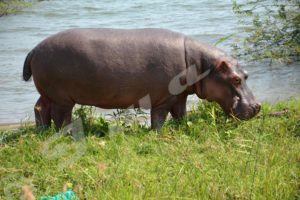In recent days, residents of Bujumbura say they meet hippos in some neighborhoods near Lake Tanganyika.Environmentalists say these hippos come out of their natural habitat to seek food because they are threatened with hunger.

A hippopotamus grazing along Lake Tanganyika in south Bujumbura
“We are afraid of these hippopotamuses roaming in our neighborhoods. Whenever we see them, we run away. They have already killed people on the shores of Lake Tanganyika, “said a resident of Kibenga Lac neighborhood, adding that they often move around in the area.
“We frequently meet hippopotamuses on the streets. Our children no longer leave houses after 6p.m. They are really scary, “said another resident of Kibenga, 100 meters from the shore of Lake Tanganyika. He also says these hippopotamuses ravage their fields.
He calls on the Ministry of Environment to find ways to prevent them from moving in inhabited areas.
“They come out of their natural habitat to seek food”
Jacques Nkengurutse, Environmental activist and Secretary General of the Association for the Protection of the Environment (ACVE) says the phenomenon of hippos coming out of their natural environment is a proof that they do not have enough food.
Hippopotamuses are generally found in the Rusizi plain and in the northern side of Lake Tanganyika.
“As the coastal path of Lake Tanganyika and Ruzizi River continue to be built on or cultivated, these hippopotamuses are increasingly going out of their natural habitats to seek food,” Nkengurutse says.
He adds that an effective inventory must be made to find out how many animals exist in Rusizi National Park and identify the amount of food each animal needs to live quietly in its natural habitat.
For Nkengurutse, hippos can contract diseases if they continue to frequent places where people live. “This species may disappear permanently,” says Nkengurutse adding that hippopotamuses are classified among species threatened with extinction in the world.
Samuel Ndayiragije, Chief Executive Officer of the National Office for the Protection of the Environment (OPB), says the office is recovering the land already acquired illegally by the population. “We are trying to save the small grazing land remaining at the coast of Lake Tanganyika,” he says.
According to the Burundi Water Code, Lake Tanganyika should preserve 150 m of coast path. “This area does not exist anymore because of the buildings erected close to the lake,” says Ndayiragije. He calls on the population to contribute to the preservation and conservation of biodiversity. “If there is no biodiversity, even man will disappear,” says the CEO of OPB.



















 IWACU Open Data
IWACU Open Data

